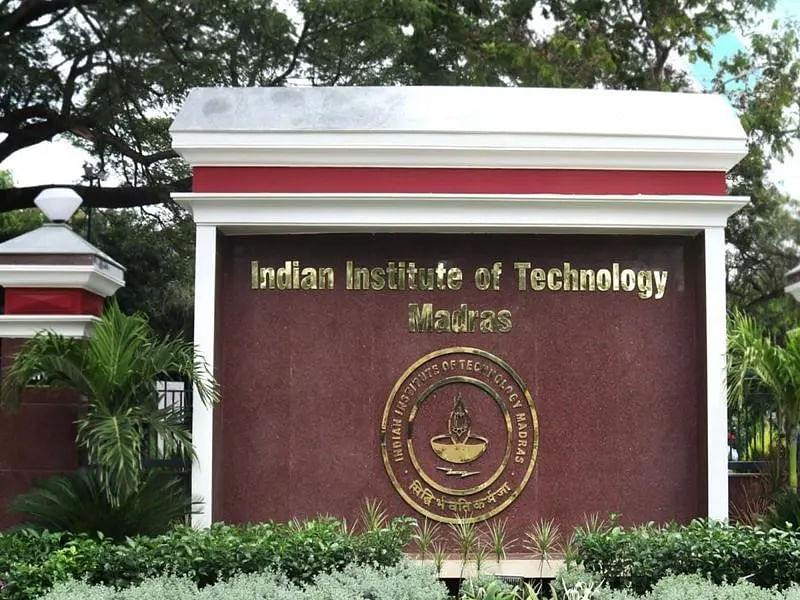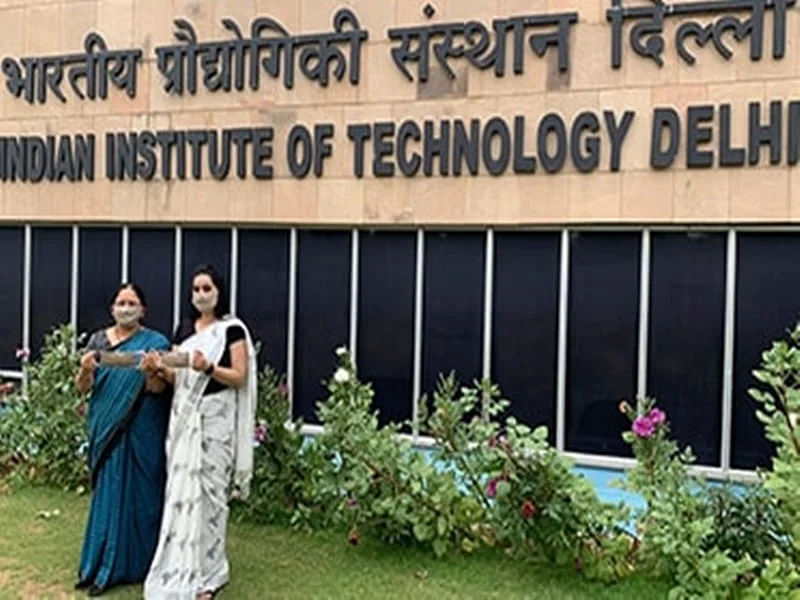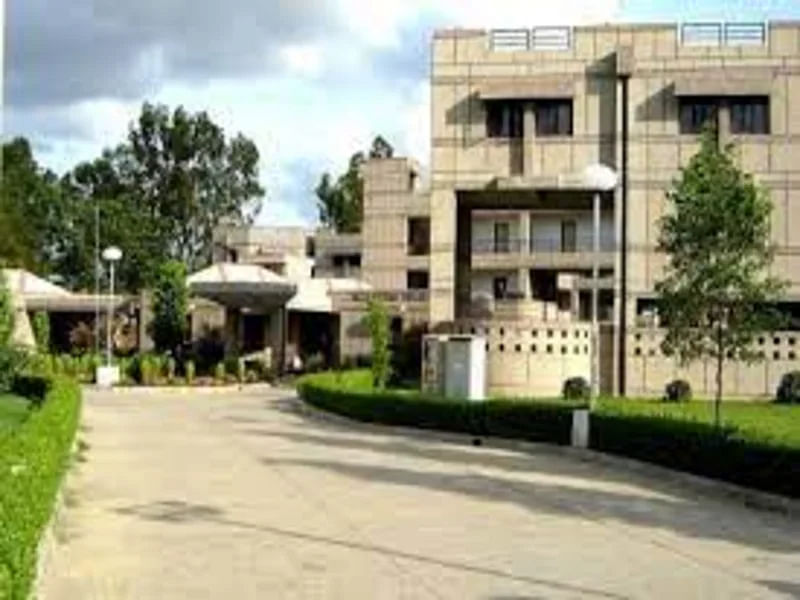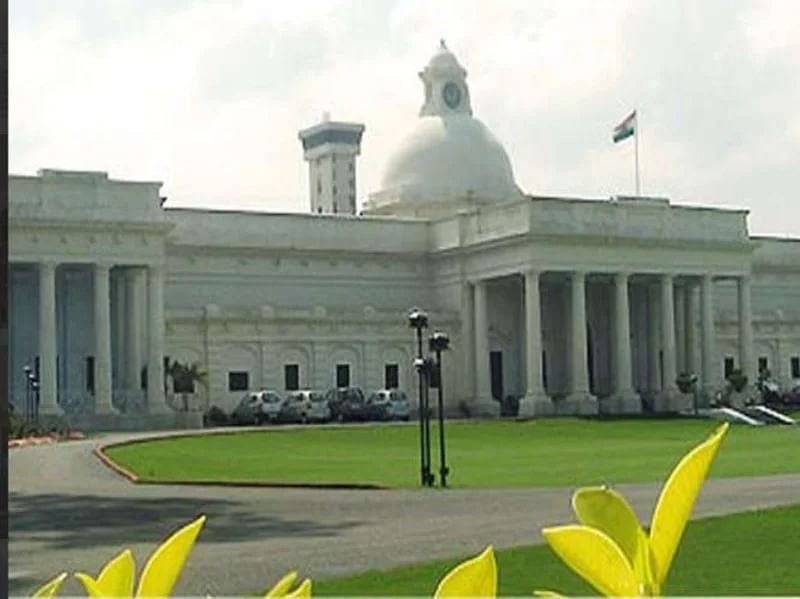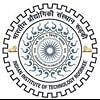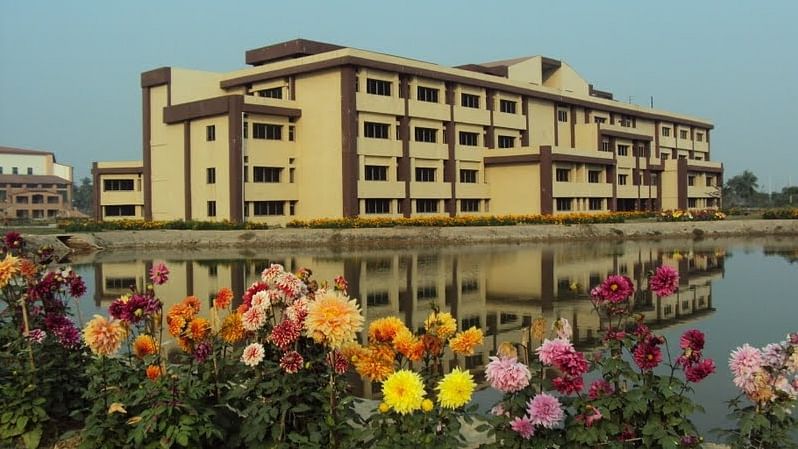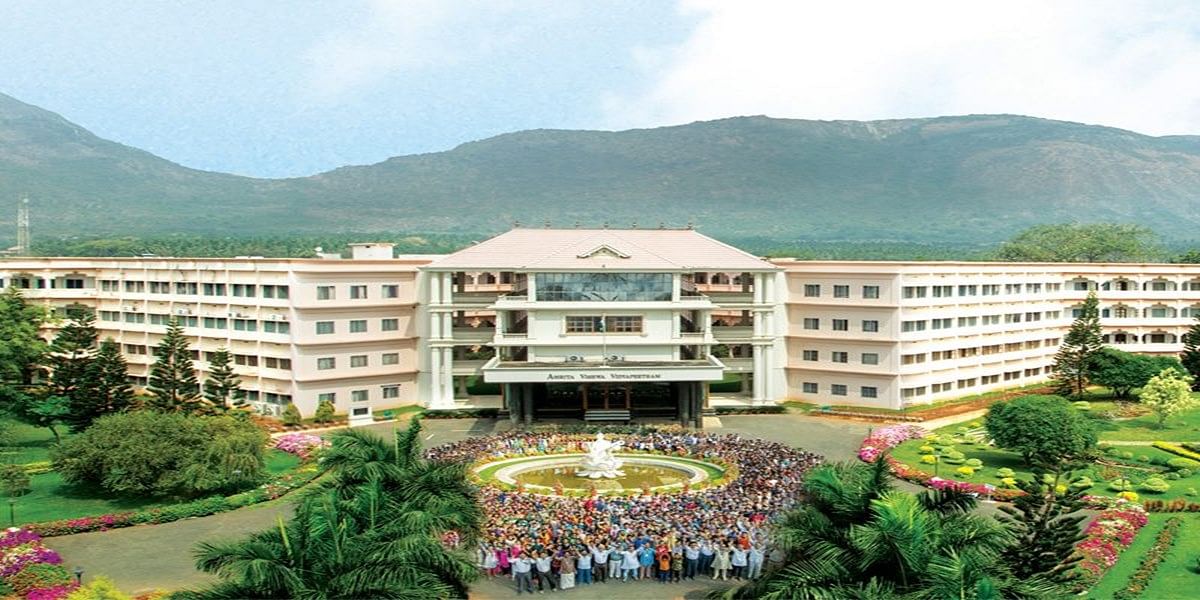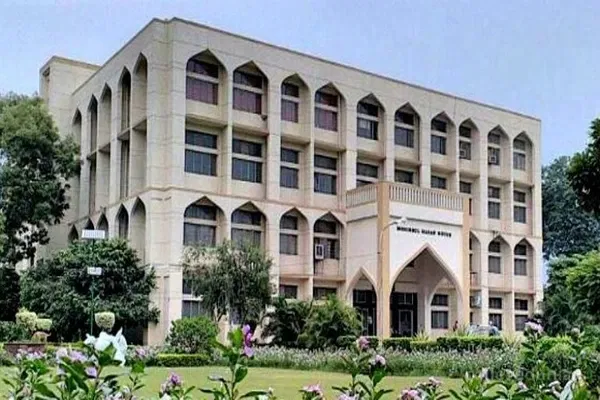BTech Civil Engineering Syllabus and Subjects

The B.Tech Civil Engineering syllabus is structured to cover core engineering principles, practical skills, and areas such as Structural Engineering, Geotechnical Engineering, Hydraulics, etc. The B.Tech Civil Engineering course is divided into eight semesters and spans four years, offering core and elective courses, practicals, internships, and projects.
The core B.Tech Civil Engineering subjects include foundational topics such as Physics, Maths, Basic Electrical Engineering, Concrete Technology, Fluid Mechanics, etc. The elective subjects include program-specific courses such as Structural Engineering, Transportation Infrastructure, Construction Engineering, Hydraulics, etc that students can choose from.
The B.Tech Civil Engineering course provides expertise in infrastructure design, construction, and maintenance. Graduates gain theoretical knowledge, practical experience, and professional development to contribute to civil engineering advancements.
Table of Contents
Semester Wise B.Tech Civil Engineering Syllabus
The B.Tech Civil Engineering syllabus in India is generally the same as the one based on the model prepared by the AICTE. However, there may be slight differences in certain subjects and elective choices offered.
The semester-wise BTech Civil Engineering syllabus followed by most of the colleges in India is provided below:
BTech Civil Engineering 1st Year Syllabus
The B.Tech Civil Engineering 1st year syllabus focuses on fundamental science and engineering subjects such as Physics, Chemistry, Basic Electrical Engineering, Design Thinking, etc along with practical sessions to complement theoretical knowledge.
The B.Tech Civil Engineering first-year syllabus is provided in the table below:
| Semester I | Semester II |
| Physics-I (Mechanics and Mechanics of Solids) | Chemistry -I |
| Mathematics-I | Mathematics-II |
| Basic Electrical Engineering | Programming for Problem Solving |
| Engineering Graphics & Design | Biology for Engineers |
| English for Technical Writing | Digital Fabrication /Workshop / Manufacturing Practices |
| Design Thinking | Universal Human Values |
| IDEA Lab Workshop | Sports and Yoga or NSS/NCC |
Practical Topics for 1st Year B.Tech Civil Engineering
The practical topics covered in 1st year BTech Civil Engineering syllabus include:
- Physics Laboratory
- Chemistry Laboratory
- Programming For Problem-Solving Laboratory
- Digital Fabrication
- Manufacturing Methods
BTech Civil Engineering 2nd Year Syllabus
The B.Tech Civil Engineering syllabus 2nd year delves into core engineering subjects like Solid Mechanics, Fluid Mechanics, Concrete Technology, etc.
The BTech Civil Engineering 2nd year syllabus is provided in the table below:
| Semester III | Semester IV |
| Solid Mechanics | Transportation Engineering |
| Mathematics to Civil Engineering -I | Surveying and Geomatics |
| Civil Engineering Materials, Testing & Evaluation | Geotechnical Engineering |
| Building Planning and Computer Aided Civil Engineering drawing | Hydraulic Engineering |
| Concrete Technology | Structural Analysis |
| Fluid Mechanics | Construction Engineering & Management |
| Indian Knowledge System | Civil Engineering - Societal & Global Impact |
| Disability, Accessibility and Universal Design | - |
Practical Topics for B.Tech Civil Engineering 2nd Year
The practical subjects covered in B.Tech Civil Engineering second year are outlined below:
- Civil Engineering Materials, Testing & Evaluation
- Fluid Mechanics
- Geotechnical Engineering
- Hydraulic Engineering Laboratory
B.Tech Civil Engineering 3rd Year Syllabus
The BTech Civil Engineering 3rd year syllabus focuses on advanced topics such as Structural Design, Water Resource Engineering, etc and program-specific elective subjects allowing specialisation in areas such as Structural Engineering, Environmental Engineering, etc.
The BTech Civil Engineering 3rd year syllabus is outlined in the table below:
| Semester V | Semester VI |
| Structural Design -I | Structural Design -II |
| Environmental Engineering | Intelligent Transportation Systems |
| Engineering Economics, Estimation & Costing | Sustainable and Green Construction |
| Hydrology & Water Resources Engineering | Program Elective Course -2 |
| Plumbing (Water and Sanitation) | Program Elective Course -3 |
| Multidisciplinary Open Electives Courses -1 | Multidisciplinary Open Electives Courses -2 |
| Professional Practice, Law & Ethics | Instrumentation & Sensor Technologies for Civil Engineering Applications |
Practical Topics for 3rd Year B.Tech Civil Engineering
The practical subjects under B.Tech Civil Engineering 3rd year syllabus includes:
- Structural Design Laboratory
- Plumbing (Water and Sanitation) Laboratory
BTech Civil Engineering 4th Year Syllabus
B.Tech Civil Engineering 4th year syllabus focuses on concepts such as Robotics and Disaster Planning and allows students to choose from program specific elective subjects such as Transportation Infrastructure, Environmental Engineering, Hydraulics, etc to further specialise and gain practical experience through internships and projects.
The BTech Civil Engineering fourth year syllabus is provided in the table below:
| Semester VII | Semester VIII |
| Robotics and Automation | Program Elective Course - 5 |
| Program Elective Course - 4 | Program Elective Course - 6 |
| Multidisciplinary Open Electives Courses - 3 | Program Elective Course -7 |
| Internship | Multidisciplinary Open Electives Courses - 4 |
| Disaster Preparedness & Planning | Project |
BTech Civil Engineering Subjects
B.Tech Civil Engineering subjects cover core, elective, and practical topics and focus on Structural Engineering, Transportation Engineering, Geotechnical Engineering, Environmental Engineering, Construction Management, etc.
A detailed overview of the BTech civil engineering subjects is detailed in the sections below.
B.Tech Civil Engineering First Year Subjects
BTech Civil Engineering first year subjects include basic science subjects, engineering science subjects, core engineering subjects, and additional compulsory subjects for a well-rounded foundation.
Listed below are B.Tech Civil Engineering 1st year subjects and topics covered:
| Subjects | Topic Covered | Subject Type |
| Physics-I (Mechanics and Mechanics of Solids) | Rotation Transformation, Forces in Nature, Newton’s Law, Potential Energy Functions, Centripetal and Coriolis Accelerations, Harmonics Oscillator, Kinematics, Motion. | Core (Basic Science Courses) |
| Mathematics-I | Basic Calculus, Single-variable Calculus, Sequences and Series, Differentiation, Integration. | Core (Basic Science Courses) |
| Basic Electrical Engineering | D.C. Circuits, Ohm’s Law, Kirchoff’s Laws, A.C. Circuits, Transformers, EMF Equation, DC Machines, Three Phase Induction Motors, Electrical Power Covering. | Core ( Engineering Science Courses) |
| Engineering Graphics & Design | Traditional Engineering Graphics, Computer Graphics: Engineering Graphics Software, Introduction to Engineering Drawing, Orthographic Projections, Customisation & CAD Drawing. | Core ( Engineering Science Courses) |
| English for Technical Writing | Vocabulary Building, Basic Writing Skills, Identifying Common Errors in Writing, Nature and Style of sensible Writing, : Oral Communication. | Core (Humanities & Social Sciences) |
| Design Thinking | Remembering Memory, Emotions: Experience & Expression, Basics of Design Thinking, Process of Product Design, Prototyping & Testing, | Core ( Engineering Science Courses) |
| IDEA Lab Workshop | Electronic Component Familiarisation, Introduction to Hand Tools, Basic Measurement Instruments, Mechanical Cutting Processes, 3D Printing and Prototyping Technology. | Compulsory Course |
| Chemistry -I | Atomic and Molecular Structure, Spectroscopic Techniques, Intermolecular Forces, Free Energy in Chemical Equilibria, Periodic Properties, Stereochemistry, Organic Reactions. | Core (Basic Science Courses) |
| Mathematics-II | Matrices, Differential Equations, Complex Variable- Differentiation and Integration. | Core (Basic Science Courses) |
| Programming for Problem Solving | Introduction to Programming, Arithmetic Expressions and Precedence, Conditional Branching and Loops, Arrays, Basic Algorithms, Function, Recursion, Structures, Pointers, File Handling. | Core ( Engineering Science Courses) |
| Biology for Engineers | Classification, Genetics, Biomolecules, Enzymes, Information Transfer, Macromolecular Analysis, Metabolism, Microbiology. | Core (Basic Science Courses) |
| Digital Fabrication /Workshop / Manufacturing Practices | 3D Printing (Additive Manufacturing), CAD for Additive Manufacturing, Materials, Additive Manufacturing Equipment, Post Processing: Requirement and Techniques, Product Quality. | Core ( Engineering Science Courses) |
| Universal Human Values | Introduction to Value Education,– Harmony in the Human Being, Harmony in the Family and Society, Harmony in the Nature/Existence, Implications of the Holistic Understanding. | Core (Humanities & Social Sciences) |
| Sports and Yoga or NSS/NCC | Introduction to Physical Education, Olympic Movement, Physical Fitness, Wellness & Lifestyle, Fundamentals of Anatomy & Physiology in Physical Education, Sports and Yoga. | Compulsory Course |
B.Tech Civil Engineering Second Year Subjects
The BTech Civil Engineering second-year subjects cover important engineering concepts and principles such as Concrete Technology, Fluid Mechanics, etc.
The 2nd year B.Tech Civil Engineering subjects and topics covered are provided below:
| Subjects | Topic Covered | Subject Type |
| Solid Mechanics | Simple Stresses and Strains, Compound Stresses and Strains, Bending Moment, Shear Force, Flexural Stresses, Shear Stresses, Slope, Deflection, Torsion, Thin Cylinders and Spheres. | Core ( Engineering Science Courses) |
| Mathematics to Civil Engineering -I | Vector Calculus, Fourier Series, Laplace Transforms and Applications, Partial Differential Equation, Matrices | Core (Basic Science Courses) |
| Civil Engineering Materials, Testing & Evaluation | Engineering Materials, Material Testing, Standard Testing & Evaluation Procedures, | Core ( Engineering Science Courses) |
| Building Planning and Computer Aided Civil Engineering Drawing | Principles of Residential and Public Buildings, Principle of Planning for Differently Abled Publics, Planning of Building, . Water Supply, Drainage, Waste, Electrical Services, Fire Protection, Elevators, Ventilation, A.C. | Core |
| Concrete Technology | Properties of Ingredients, Types, Methods, Admixtures, Ready Mix Concrete, Testing. | Core |
| Fluid Mechanics | Basic Concepts and Definitions, Fluid Statics, Fluid Kinematics, Fluid Dynamics. | Core |
| Disability, Accessibility and Universal Design | Concepts of Disability, Types, Environmental Needs, Accessibility andUniversal Design | Compulsory Course |
| Transportation Engineering | Highway Development, Design, Planning, Accessibility to Differently Abled Publics, Traffic Engineering & Control, Pavement Materials, Designs. | Core |
| Surveying and Geomatics | Introduction to Surveying, Triangulation and Trilateration, Curves, Modern Field Survey Systems, Photogrammetry Surveying, Remote Sensing. | Core |
| Geotechnical Engineering | Soil, Plasticity Characteristics of Soil, Permeability of Soil, Effective Stress Principle, Compaction of Soil-Introduction, Consolidation of Soil, Shear Strength, Stability of Slopes, Soil Exploration. | Core |
| Hydraulic Engineering | Laminar Flow, Turbulent Flow, Boundary Layer Analysis, Dimensional Analysis and Hydraulic Similitude, Open Channel Flow-Comparison, Uniform Flow-Continuity Equation, Non-Uniform Flow. | Core |
| Structural Analysis | General Theorems, Statically Determinate Structures, Influence Lines, Elastic Arches, Suspension Bridges, Column and Struts, Flexibility Method, Stiffness Method. | Core |
| Construction Engineering & Management | Basics of Construction, Construction Project Planning, Construction Methods, Equipments, Construction Site & Resources, Project Monitoring & Control, Construction Cost. | Core |
| Civil Engineering - Societal & Global Impact | Impact on Infrastructure, Environment, Built Environment, Civil Engineering Projects. | Compulsory Course |
B.Tech Civil Engineering Third Year Subjects
The BTech Civil Engineering third year subjects allow students to choose from areas of specialisation such as Structural Engineering, Transportation Infrastructure, Geo-Informatics, Environmental Engineering, etc.
Listed below are the core courses and the program-specific elective subjects offered in the B.Tech Civil Engineering third year syllabus:
| Subjects | Topic Covered | Type of Subject |
| Structural Design -I | Working Stress Method & Ultimate Load Method of Design, Limit State Method of Design, Pre-Stressed Concrete. | Core |
| Environmental Engineering | Water, Sewage, Air, Noise, Building Plumbing, Government Authorities and their roles in water supply and waste management. | Core |
| Engineering Economics, Estimation & Costing | Basic Principles and Methodology of Economics, Public Sector Economics, Elements of Business/Managerial Economics, Indian Economy, Estimation,Minimum Wages. | Core |
| Hydrology & Water Resources Engineering | Introduction, Precipitation, Abstractions From Precipitation, Runoff, Groundwater and Well Hydrology, Water Withdrawals and Uses, Distribution Systems, Dams and Spillways. | Core |
| Plumbing (Water and Sanitation) | Importance of Codes, Architectural and Structural Coordination, Plumbing Terminology, Plumbing Fixtures and Fittings, Traps, Interceptors, Indirect Waste and Vents, Sanitary Drainage and Storm Drain, Water Supply, WTP, STP. | Elective (Program Elective Course) |
| Professional Practice, Law & Ethics | Standardisation Bodies, Professional Ethics, Contracts Management, Arbitration, Conciliation and ADR, Labour, Intellectual Property Law. | Compulsory Course |
| Structural Design -II | Bolted and Welded Connections, Roofing System, Flooring System, Columns and Bases | Core |
| Intelligent Transportation Systems | Definition, Objectives, Automatic Vehicle Location, GIS, Telecommunication in ITS, ATMS. | Core |
| Sustainable and Green Construction | Sustainable Development, Environment Science and Ecology, Sustainable Construction Material and Technology, Sustainable Site Planning, Regulations and Policy. | Core |
| Instrumentation & Sensor Technologies for Civil Engineering Applications | Measurement, Sensing and Instrumentation, Data Analysis and Interpretation, Frequency Domain Signal Processing and Analysis. | Compulsory Course |
| Specialisation | Structural Engineering/Construction Engineering/ Geotechnical Engineering/ Geo Informatics/ Transportation Infrastructure/ Environmental Engineering/ Hydrology & Water Resources Engineering/ Hydraulics/ Ocean Engineering/ Diversified Courses | Elective (Program Specific) |
B.Tech Civil Engineering Fourth Year Subjects
The BTech Civil Engineering fourth year subjects include a core course and program specific elective subjects.
Listed below are the B.Tech Civil Engineering fourth year subjects and the topics covered under them:
| Subjects | Topic Covered | Subject Type |
| Robotics and Automation | Principles of Robotics and Automation, Fundamentals of Civil Engineering, Sensors and Actuators, Kinematics and Dynamics, Construction, Automation in Engineering, Human-Robot Collaboration. | Core |
| Disaster Preparedness & Planning | Concepts and Definitions, Disasters, Impacts, Risk Reduction, Accessibility in Disaster Contexts and Emergency Services. | Compulsory Course |
| Specialisation | Structural Engineering/Construction Engineering/ Geotechnical Engineering/ Geo Informatics/ Transportation Infrastructure/ Environmental Engineering/ Hydrology & Water Resources Engineering/ Hydraulics/ Ocean Engineering/ Diversified Courses | Elective (Program Specific) |
B.Tech Civil Engineering Program Elective Courses in Detail
The elective subjects offered by the institutions in India may vary. However, the list of elective courses recommended by the AICTE that students can choose from is provided in the table below:
| Programs Offered | Program Specific Electives |
| Structural Engineering |
|
| Construction Engineering |
|
| Geotechnical Engineering |
|
| Geo Informatics |
|
| Transportation Infrastructure |
|
| Environmental Engineering |
|
| Hydrology & Water Resources Engineering |
|
| Hydraulics |
|
| Ocean Engineering |
|
| Diversified Courses |
|
B.Tech Civil Engineering Course Structure
The BTech Civil Engineering course structure spans over four years and is strategically designed to provide a comprehensive understanding of foundational and advanced knowledge of the basic engineering principles and specialised areas of civil engineering.
The BTech Civil Engineering course structure followed by most colleges in India is outlined below:
- Eight Semesters
- Core Subjects
- Elective Subjects
- Practicals
- Internship
- Project
BTech Civil Engineering Teaching Methodology and Techniques
The teaching methodology and techniques for B.Tech Civil Engineering require a dynamic approach to learning. In addition to the traditional teaching methods, students engage in hands-on learning experiences and practical application of theoretical concepts.
Listed below are some of the teaching techniques and methods employed in B.Tech Civil Engineering course:
- Lectures
- Laboratory Experiments and Demonstrations
- CAD Training
- Case Studies
- Group Discussion and Collaborative Projects
- Guest Lecturers
- Industrial Visits
- Workshops
- Seminars
B.Tech Civil Engineering Projects
Projects are an integral part of the B.Tech Civil Engineering course curriculum, allowing students to apply theoretical knowledge to real-world problems in the field. Some of the common Civil Engineering BTech project topics are listed below:
- Structural Analysis and Design of High-Rise Buildings
- Traffic Flow Simulation and Optimization for Urban Transportation System
- Environmental Impact Assessment of Construction Projects
- Development of Smart Infrastructure using IoT and Sensor Technologies
- Use of Innovative Materials and Technologies in Bridge Construction
- Design and Implementation of Sustainable Urban Drainage Systems
- Investigate the Feasibility of Installing Green Roof Systems
- Develop Solutions for Coastal Erosion Control and Management
BTech Civil Engineering Books
The B.Tech Civil Engineering books aid in providing in-depth coverage of foundational principles, advanced theories, and practical applications in the field of civil engineering.
The year-wise BTech Civil Engineering books followed by colleges across India are provided in the sections below:
BTech Civil Engineering Books First Year
The first year BTech Civil Engineering books cover fundamental science and engineering concepts essential for building a strong engineering base. The B.Tech Civil Engineering books are provided in the table below for reference:
| Books | Authors | Topics Covered |
| Engineering Mechanics | M.K. Harbola | Statics, Dynamics, Mechanics of Materials |
| Engineering Mathematics | Reena Garg | Calculus, Linear Algebra, Vector Calculus |
| Engineering Graphics and Design | Jain, Maheshwari, Gauta, | Engineering Drawing, CAD, Modelling. |
| Chemistry | M.J. Sienko and R.A. Plane | Atomic Structure and Periodicity, Chemical Bonding and Molecular Structure, States of Matter. |
| General Biology | Uma Devi Koduru | Cell Biology, Genetics, Taxonomy and Classification. |
B.Tech Civil Engineering Books Second Year
The BTech Civil Engineering second year books explore advanced areas of engineering such as Concrete Technology, Construction Materials, etc. The B.Tech Civil Engineering 2nd year books are listed below:
| Books | Authors | Topics Covered |
| Civil Engineering Construction Materials | S.K. Sharma | Properties and Characteristics, Testing and Quality Control, Sustainable Materials |
| Building with an Integrated Approach to Build Environment | M.G. Shah, Kale, Patki | Architectural Drawing Technique, Building Components and Construction Methods, Integration of Architectural and Structural Drawings |
| Concrete Technology | M.L. Gambhir | Properties and Behaviour, Mix Design, Proportioning, Testing, Construction Techniques. |
| Principles of Transport Engineering | Partha Chakraborty | Transportation Planning and Engineering, Systems and Modes, Traffic Flow Theory. |
| Soil Mechanics | R.F. Craig | Soil Properties, Classification, Compaction, Permeability. |
BTech Civil Engineering Books Third Year
The third year BTech Civil Engineering books focus on topics of specialisation in specific fields of civil engineering such as Environmental Engineering, Hydrology, etc. The B.Tech Civil Engineering 3rd year books followed by most colleges in India are provided below:
| Books | Authors | Topics Covered |
| Environmental Engineering | M.P. Poonia, S.C. Sharma, Santosh Kumar | Water Quality Parameters, Standards, Water Supply and Treatment Methods, Management |
| Engineering Hydrology | K Subramanya | Hydrological Cycle, Runoff Estimation Method, Flood, Groundwater Hydrology and Aquifer. |
| Legal Aspects of Building and Engineering Contracts | Premvir Kapoor | Contract Law Principles and Fundamentals, Types, Contractual Rights, Dispute Resolution. |
| Measurement and Instrumentation Principles | Alan S Morris | Measurement Systems and Units, Sensors and Transducers, Electronic Instrumentation and Signal Processing. |
| Elements of Water Pollution Control Engineering | O.P. Gupta | Sources and Types of Water Pollutants, Quality Parameters, Pollution Prevention and Treatment Technologies. |
B.Tech Civil Engineering Books Fourth Year
The B.Tech Civil Engineering fourth year books focus on advanced topics enabling students to gain expertise in specialised areas such as Robotics, Structural Engineering, etc. The B.Tech Civil Engineering books followed in fourth year are listed in the table below:
| Books | Authors | Topics Covered |
| Limit State Design of Steel Structures | S.K. Duggal | Principles, Design of Steel Structural Elements such as Beams, Columns, Structural Analysis And Design for Steel Buildings and Bridges. |
| Measurement Theory for Engineers | Ilya Gertsbakh | Fundamentals of Measurement Theory, Metrology, Uncertainty and Error Analysis, Statistical Methods. |
| Advanced Robotics | Sabrie Soloman | Robot Kinematics & Dynamics, Control Systems, Robotic Vision, Machine Learning, Autonomous Navigation. |
| Disaster Management | S.C. Sharma | Disaster Risk Management, Emergency Risk Planning & Coordination, Recovery and Rehabilitation, Legal and Policy Aspects. |
Top B.Tech Civil Engineering Colleges
Top Engineering Entrance Exams
B.Tech Civil Engineering Fee Structure
FAQs on B.Tech Civil Engineering Syllabus and Subjects
Q: What are the subjects in B Tech Civil Engineering?
Q: What is taught in 1st year of Civil Engineering?
Q: Does B.Tech Civil Engineering have Maths?
Q: What is the hardest subject in civil engineering?
Q: What are the specialisations offered in B.Tech Civil Engineering?
Q: Are there practicals or labs in B.Tech Civil Engineering?
Q: What are the elective subjects in B.Tech Civil Engineering?
Q: How is the subject of Construction Management covered in B.Tech Civil Engineering?
Q: How are students evaluated in the B.Tech Civil Engineering program?
Q: What are the key subjects covered in the B.Tech Civil Engineering 3rd semester syllabus?
Q: What topics are included in the B.Tech Civil Engineering 5th sem syllabus?
